The International Monetary Fund has hinted at finalising its Governance Diagnostic for Ghana in the first quarter of 2024.
This follows the completion of the assessment of the project in October 2023.
The Governance Diagnostic aims to support the Ghana government’s own efforts under the Post Covid-19 Programme for Economic Growth to address gaps in the country’s governance systems, to promote the efficiency of public spending, enhance competitiveness, and lay the foundations for higher and more inclusive growth.
“Collaboration on the Governance Diagnostic will continue until the exercise concludes with the finalization of a report, setting out the findings in detail as well as recommendations, which is expected to be finalized in the first quarter of 2024”, it added..
An IMF Technical Assistance mission led by Gomiluk Otokwala visited Accra over the period of October 16–27, 2023 to conduct a Governance Diagnostic.
The mission comprising staff from the Legal, the Fiscal Affairs and the Monetary and Capital Markets Departments of the IMF assessed the scope and strength of the governance and anti-corruption framework in Ghana, identified the gaps, and offered reform options, as guided by the IMF’s framework for Enhanced Engagement in Addressing Governance Weaknesses.
The mission team also discussed with the authorities the many recent initiatives undertaken by the Ghanaian government to strengthen governance, and how to further strengthen the anti-corruption framework in revenue administration, public financial management, rule of law (in particular, enforcement of property rights), controls for Anti-Money Laundering / Combatting the Financing of Terrorism as well as governance in financial sector oversight.
The mission met with Ghanaian authorities, including the Chief Justice of Ghana and some Supreme Court Justices; the Attorney General and Minister for Justice; Deputy Minister for Finance in charge of Revenue as well as the Governor and Deputy Governors of the Bank of Ghana.
The mission also met with heads and senior staff of key institutions and agencies including the Ministry of Finance, the Bank of Ghana, the Office of the Special Prosecutor, the Ghana Revenue Authority, Public Procurement Authority, the Commission on Human Rights and Administrative Justice and Ghana Police Service, as well as senior officials, and representatives of the private sector, academia, civil society and international development partners.











